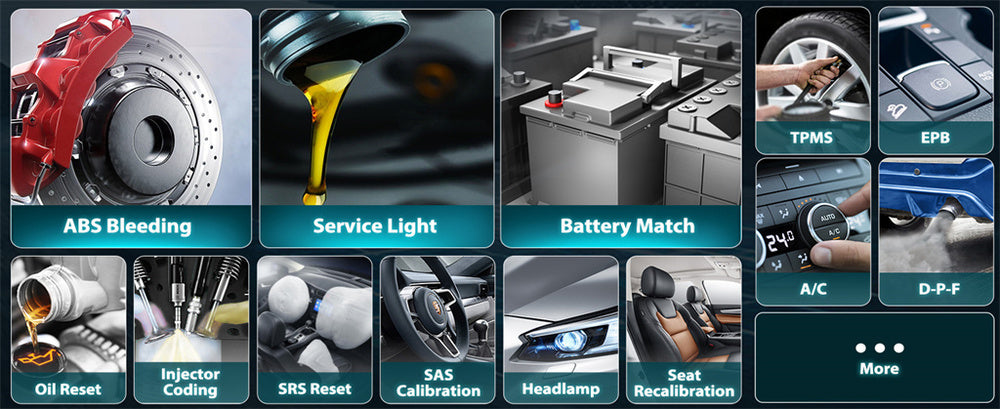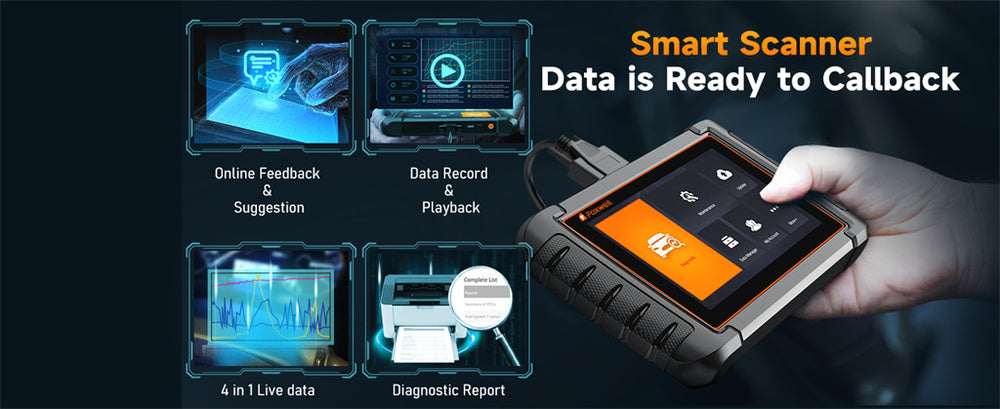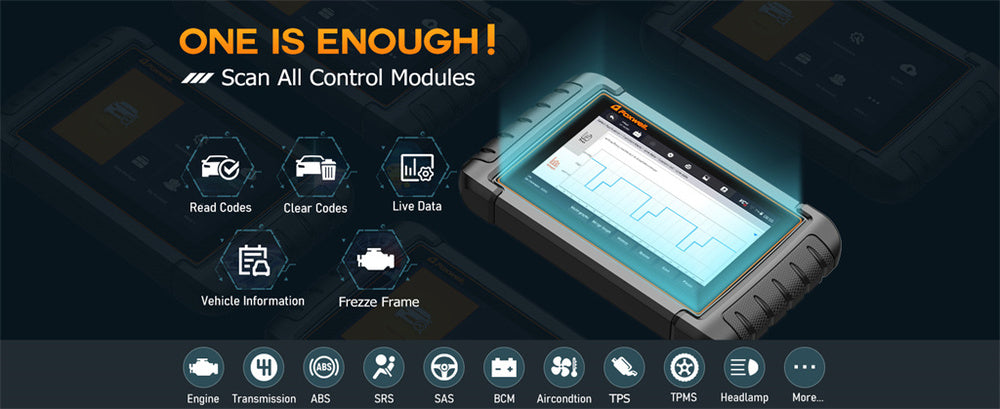Car code scanners are invaluable tools for diagnosing vehicle issues. Whether you’re dealing with a pesky check engine light or just want to keep tabs on your car’s health, these devices can be a game-changer.
With so many options on the market, like the versatile Foxwell NT726, choosing the right one can feel like finding a needle in a haystack. Reading reviews can illuminate the path, but you need to know how to sift through the noise to find the most useful information. Here are some tips on how to get the most out of car code scanner reviews.
Identify Credible Sources

Start by identifying credible sources for reviews. Trustworthy sources typically provide detailed, unbiased reviews and are transparent about any affiliations. Here’s how to find them:
- Automotive Websites: Look for reviews on reputable automotive websites such as Edmunds, Car and Driver, and AutoTrader. These platforms often employ experts who thoroughly test and review products.
- Retailer Reviews: Websites like Amazon, Best Buy, and Walmart have customer review sections. While these reviews can be helpful, be cautious of overly positive or negative reviews that may be biased.
- Forums and Communities: Online communities such as Reddit’s r/MechanicAdvice and automotive forums are great places to find honest opinions from experienced users.
Look for Detailed Comparisons
Reviews that include detailed comparisons between different car code scanners can provide valuable insights. Here’s what to look for:
Feature Comparisons: Reviews that compare features such as compatibility, data reading capabilities, and ease of use across different models can help you understand the strengths and weaknesses of each scanner.
For example, the Foxwell NT726 is noted for its extensive vehicle coverage and advanced diagnostic functions, which can be contrasted with more basic models that might only read and clear codes.
Price Comparisons: Understanding the price differences and whether the additional features justify the cost is crucial. Look for reviews that discuss the value for money each scanner provides.
A higher-priced scanner like the Foxwell NT726 may offer bi-directional control and ECU programming, which can be beneficial for advanced users but may be overkill for casual users who might be satisfied with a less expensive, basic scanner.
Performance Comparisons: Pay attention to how different scanners perform under various conditions. Reviews that include real-world testing scenarios can be particularly insightful. Performance aspects such as speed of reading codes, accuracy of diagnostics, and the ability to clear trouble codes effectively are critical factors to consider.
Comparisons should highlight whether the scanners perform consistently across different vehicle makes and models, especially under different weather conditions or in various states of engine health.
Additional Tips for Comparison Reviews:
- Head-to-Head Tests: Look for reviews that conduct head-to-head tests between two or more scanners. These can provide direct performance metrics and user experiences.
- Pros and Cons Lists: Reviews that include pros and cons lists for each scanner can help you quickly identify key strengths and weaknesses.
- Usage Scenarios: Reviews that describe how each scanner performs in different scenarios (e.g., routine maintenance vs. complex diagnostics) can give you a better idea of which model suits your needs.
Pay Attention to User Experience
The user experience is a critical factor in choosing a car code scanner. Look for reviews that discuss:
- Ease of Use: Reviews should mention how user-friendly the scanner is, including the setup process, interface design, and readability of the display. For instance, the Foxwell NT726 is often praised for its intuitive touchscreen interface and clear graphical data display, which can make it easier for both novice and experienced users to navigate.
- Setup Process: Detailed reviews often describe the initial setup process, highlighting whether it’s straightforward or cumbersome. A good scanner should have a quick setup with easy-to-follow instructions. Reviews that describe a seamless out-of-the-box experience, with minimal need for additional setup or calibration, are indicative of a user-friendly product.
- Software and Updates: Consider reviews that discuss the ease of updating the scanner’s software. Scanners with simple, user-friendly update processes are preferable. For example, a positive review might note that the Foxwell NT726 offers straightforward Wi-Fi updates, ensuring users can easily keep their device current with the latest vehicle data and diagnostic capabilities.
- Customer Support: Good reviews often touch on the quality of customer support provided by the manufacturer. Responsive and helpful customer service can be a significant advantage, especially if you encounter issues or have questions about the scanner’s functionality. Look for mentions of customer service experiences in the reviews, such as prompt responses, effective solutions, and overall satisfaction with the support received.
- User Manuals and Documentation: High-quality user manuals and documentation can greatly enhance the user experience. Reviews that mention clear, comprehensive manuals and readily available online resources are valuable. The availability of tutorial videos and FAQs on the manufacturer’s website can also be a plus.
- Portability and Build Quality: Assessments of the scanner’s portability and build quality can give you an idea of its longevity and how well it can withstand regular use. Reviews that highlight the durability of the scanner, including its resistance to drops, dust, and other garage hazards, can be very insightful.
Additional Tips for User Experience Reviews:
- Hands-On Experiences: Look for reviews where the user shares hands-on experiences, providing detailed accounts of how the scanner performed during actual diagnostic sessions.
- Common Issues and Fixes: Reviews that mention common issues encountered and how easy or difficult they were to resolve can provide a realistic expectation of what to anticipate.
- User Feedback on Forums: Check forums for user feedback, as these often include ongoing discussions about everyday use and troubleshooting tips that might not be covered in formal reviews.
Evaluate the Accuracy and Reliability
Accuracy and reliability are paramount when it comes to car code scanners. Reliable reviews will typically cover:
- Accuracy of Readings: Look for reviews that mention the accuracy of the scanner’s readings and its ability to detect and clear trouble codes correctly.
- Reliability Over Time: Reviews that discuss long-term reliability are valuable. Users who have had the scanner for an extended period can provide insights into its durability and ongoing performance.
Consider the Reviewer's Expertise
The expertise of the reviewer can significantly impact the quality of the review. Here’s how to gauge their expertise:
- Professional Mechanics vs. Hobbyists: Reviews from professional mechanics can provide deep insights into the scanner’s capabilities and limitations. However, hobbyists’ reviews can also be valuable, especially if you’re a DIY enthusiast.
- Detailed Technical Analysis: Reviews that include a detailed technical analysis often indicate a higher level of expertise. Look for reviewers who explain how they tested the scanner and what criteria they used.
Look for Common Themes
When reading multiple reviews, look for common themes and recurring points. This can help you identify the most reliable and critical aspects of the scanner. Here’s how:
- Consistent Praise or Criticism: If multiple reviews consistently praise or criticize a specific feature, it’s likely a significant aspect of the scanner’s performance.
- Repeated Issues: Pay attention to any recurring issues mentioned across different reviews. These could be potential deal-breakers or areas where the scanner consistently falls short.
Watch Video Reviews
Video reviews can provide a more comprehensive understanding of the car code scanner. They allow you to see the scanner in action and assess its real-world performance. Here’s what to focus on:
- Demonstrations: Look for videos that include demonstrations of the scanner’s features and functions. This can give you a clearer idea of how it works and its usability.
- Unboxing and Setup: Videos that show the unboxing and setup process can help you understand what to expect when you purchase the scanner.
- Reviewer Insights: Pay attention to the reviewer’s insights and experiences. Their commentary can provide valuable context and highlight important details that might not be covered in written reviews.

Conclusion
Reading car code scanner reviews is an excellent way to make an informed decision when purchasing a scanner. By identifying credible sources, looking for detailed comparisons, paying attention to user experience, evaluating accuracy and reliability, considering the reviewer’s expertise, looking for common themes, and watching video reviews, you can gather comprehensive and reliable information to choose the best scanner for your needs. With these tips, you’ll be well-equipped to find a car code scanner that meets your requirements and enhances your vehicle diagnostic capabilities.




Leave a comment
This site is protected by hCaptcha and the hCaptcha Privacy Policy and Terms of Service apply.